Unit 5 Do you have a soccer ball Section A教案
Unit5Doyouhaveasoccerball_SectionA1a-1c说课稿2023-202

Unit 5 Do you have a soccer ball?Section A 1a1cGood morning,dear judges! Today, it's my honor to be here to share my teaching ideas with all of you. My name is Bi Miaomiao. I e from Huhe Branch School.I will introduce my topic from eight parts: analysis of teaching material, analysis of students, learning objectives, teaching focus and difficulties, teaching and learning methods, teaching procedures, blackboard design and teaching reflection.Part 1 Analysis of teaching materialThe topic is taken from PEP, Go for it, the first book of Grade 7,Unit 5 Do you have a soccer ball? Section A 1a1c.’s a listening and speaking lesson about sports and ownership. It’s interesting and practical. Students can use the new words and sentences to municate with others in their daily life.Part 2 Analysis of studentsStudents of Grade Seven have learned English for many years and have some certain abilities of imagination, observation and creation. But they are short of vocabularies. Also, they have some difficulties in expressing themselves in English. However, they are interested in new things and have a strong thirst for knowledge. In this lesson, students can learn new words about sports and structures about ownership, which canimprove their language abilities.Part 3 Learning objectivesBased on the above analysis and the demands of new curriculum standard of 2022, there are four objectives.The first is language petence. Students can read new words such as soccer ball, volleyball and so on. They can also use the structure “Do you have a soccer ball? Yes, I do/No, I don’t” to talk about ownership.The second is learning petence. Students can understand the meaning of the target language and improve their listening and speaking skills. The third is thinking qualities. Students can use pictures, videos and objects to memorize words and expressions. The fourth is cultural awareness.They can know more about different cultures and learn to respect cultural diversity.Part 4 Teaching focus and difficultiesThe focus is to master words, phrases and sentences. The difficulties are to conduct the tasks step by step and use the target knowledge to make conversations.Part 5 Teaching and learning methodsThe teaching model is PWP. The teaching methods include situational teaching method, taskbased language teaching method, audiolingual method and independent inquiry. Students can use cooperative and exploratory learning methods. In my opinion, teaching and learning are interactions.Part 6 Teaching proceduresStep 1 Lead in (3 minutes)I greet students and make a brief selfintroduction as a P.E. and English teacher. I will give students some instructions to have a P.E. class. It can draw students’attention, arouse their interests and lead into the topic.Step 2 Prlistening (8 minutes)It mainly deals with words. I use pictures, videos and games . Then ask students to finish 1a and check the answers. This step can help students learn the target words and phrases. It can also reduce the difficulties for the following steps.Step 3 Whilelistening (4 minutes)Step 3 is about listening. Two tasks are designed to help train students’ listening skills and let students get familiar with the target sentences.Step 4 Postlistening (15 minutes)Let students practice the conversation in 1c to develop their abilities of speaking. Make their own conversations in pairs. I invite several pairs to perform to increase their awareness of cooperation. What’s more, a chant and some exercises can help them strengthen what they learned in this lesson. Practice makes perfect.Step 5 Summary (4 minutes)I make a summary to rethink what they have learned in this class. And I will give value guidance to lead students to have a healthy life. Step 6 Homework (1 minute)There are two kinds of homework: required and optional homework. Students’ability of learning and using English will be improved. They will get more practice and review after class.Part 7 Blackboard designU5 Do you have a soccer ball?Section A (1a1c)By looking at the blackboard, it’s helpful for students to get the main content of this lesson clearly.Part 8 Teaching reflectionAfter this class, I will make reflections to promote better teaching and learning.。
Unit5 DoyouhaveasoccerballSectionA课件人教版七年级英语上册

Let’s ask the teacher for English books. 5.请去给我拿一个杯子来。 Please get a cup for me.
I can’t be late . 4.get,let,ball,me,the
Let me get the ball . 5.see,basketball,you,the,can
Can you see the basketball ?
七、 完形填空。 Hello!I’m 1 .I’m an English boy.I 2 two sisters. 3 are Sonia and
Unit 5 Do you have a soccer ball
第1课时 Section A 1a~1c
一、 看图片写球类单词。
1. basketball
2. baseball
3. volleyball
4. ping-pong
5. tennis
二、 用所给词的适当形式填空。 1.Do you have (have) a ball? 2. Does (do) your cousin have a volleyball? 3.The boy has (have) two pencil boxes. 4.The hats (hat) are Jack’s. 5.We have two soccer balls (ball).
( C )1.How many volleyballs does Barry have?
塘坊初级中学七年级英语上册 Unit 5 Do you have a soccer ball Section A 1课

Practice
-- Let’s ______ for a walk. -- All right. (2012 北京改编) A. go B. going C. to go
一、选择题。
1. Gina has___, but she doesn’t have___. A. watch, balls B. a clock, watch C. clock, a ball D. a watch, a baseball bat
2d
1. Role play the conversation in 2d.; 2. Role play in groups; 3. Role play in front of the class
We’ll see which group does Cindy: Hey, Helen, let's go! We're late! Helen: OK. the best.
Unit 5 Do you have a soccer ball?
Section A Period One
Words review
do dose have tennis ball ping-pong bat soccer ball volleyball basketball v. 做;干 v. (do的第三人称单数)做;干 n. 有 n. 网球 n. 球 n. 乒乓球 n. 棒球;球拍 n. (英式)足球 n. 排球 n. 篮球
2a Listen to the conversations and number the pictures [1-4].
3
4
2
ห้องสมุดไป่ตู้
2b Listen again. Match the pictures in 2a with the balls.
人教版新课标英语七年级上册《Unit 5 Do you have a soccer ball Sec
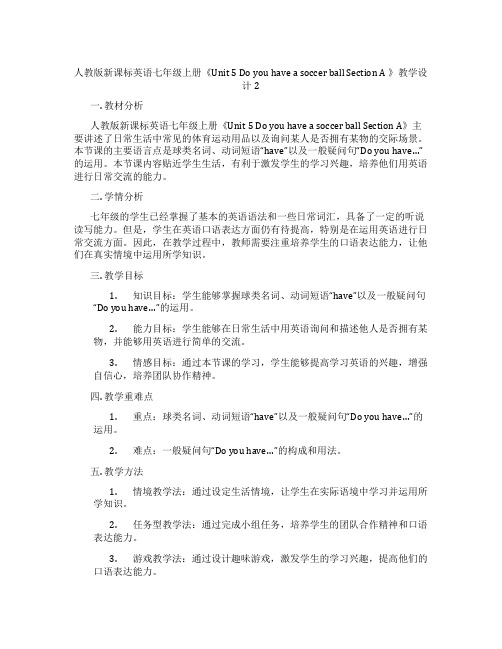
人教版新课标英语七年级上册《Unit 5 Do you have a soccer ball Section A 》教学设计2一. 教材分析人教版新课标英语七年级上册《Unit 5 Do you have a soccer ball Section A》主要讲述了日常生活中常见的体育运动用品以及询问某人是否拥有某物的交际场景。
本节课的主要语言点是球类名词、动词短语“have”以及一般疑问句“Do you have…”的运用。
本节课内容贴近学生生活,有利于激发学生的学习兴趣,培养他们用英语进行日常交流的能力。
二. 学情分析七年级的学生已经掌握了基本的英语语法和一些日常词汇,具备了一定的听说读写能力。
但是,学生在英语口语表达方面仍有待提高,特别是在运用英语进行日常交流方面。
因此,在教学过程中,教师需要注重培养学生的口语表达能力,让他们在真实情境中运用所学知识。
三. 教学目标1.知识目标:学生能够掌握球类名词、动词短语“have”以及一般疑问句“Do you have…”的运用。
2.能力目标:学生能够在日常生活中用英语询问和描述他人是否拥有某物,并能够用英语进行简单的交流。
3.情感目标:通过本节课的学习,学生能够提高学习英语的兴趣,增强自信心,培养团队协作精神。
四. 教学重难点1.重点:球类名词、动词短语“have”以及一般疑问句“Do you have…”的运用。
2.难点:一般疑问句“Do you have…”的构成和用法。
五. 教学方法1.情境教学法:通过设定生活情境,让学生在实际语境中学习并运用所学知识。
2.任务型教学法:通过完成小组任务,培养学生的团队合作精神和口语表达能力。
3.游戏教学法:通过设计趣味游戏,激发学生的学习兴趣,提高他们的口语表达能力。
六. 教学准备1.教师准备:提前准备好教学课件、球类图片、实物球类等教学资源。
2.学生准备:预习本节课内容,了解球类名词和动词短语“have”的用法。
Unit 5 Do you have a soccer ball 七年级上课文原文及重点
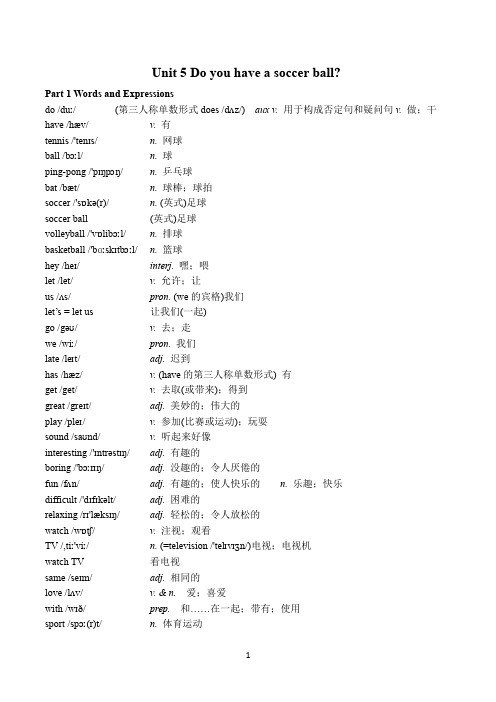
Unit 5 Do you have a soccer ball?Part 1 Words and Expressionsdo /duː/ (第三人称单数形式does /dʌz/) aux v.用于构成否定句和疑问句v.做;干have /hæv/ v.有tennis /'tenɪs/ n. 网球ball /bɔːl/ n.球ping-pong /'pɪŋpɔŋ/ n. 乒乓球bat /bæt/ n. 球棒;球拍soccer /'sɒkə(r)/ n. (英式)足球soccer ball (英式)足球volleyball /'vɒlibɔːl/ n.排球basketball /'bɑːskɪtbɔːl/ n.篮球hey /heɪ/ interj.嘿;喂let /let/ v. 允许;让us /ʌs/ pron. (we的宾格)我们let’s = let us 让我们(一起)go /gəʊ/ v.去;走we /wiː/ pron.我们late /leɪt/ adj. 迟到has /hæz/ v. (have的第三人称单数形式) 有get /get/ v.去取(或带来);得到great /greɪt/ adj.美妙的;伟大的play /pleɪ/ v. 参加(比赛或运动);玩耍sound /saʊnd/ v.听起来好像interesting /'ɪntrəstɪŋ/ adj.有趣的boring /'bɔːrɪŋ/adj.没趣的;令人厌倦的fun /fʌn/ adj.有趣的;使人快乐的n.乐趣;快乐difficult /'dɪfɪkəlt/ adj. 困难的relaxing /rɪ'læksɪŋ/ adj.轻松的;令人放松的watch /wɒtʃ/ v.注视;观看TV /,tiː'viː/ n. (=television /'telɪvɪʒn/)电视;电视机watch TV看电视same /seɪm/ adj. 相同的love /lʌv/ v. & n. 爱;喜爱with /wɪð/ prep.和……在一起;带有;使用sport /spɔː(r)t/ n. 体育运动them /ðəm/ pron. (they的宾格) 他(她、它)们only /'əʊnli/ adv.只;仅like /laɪk/ v. 喜欢;喜爱easy /'iːzi/ adj.容易的;不费力的after /'ɑːftə(r)/prep. & conj.在……之后class /klɑːs/ n.班级;课classmate /'klɑːsmeɪt/ n.同班同学Bill /bɪl/比尔(男名)Part 2:Texts课文(一)Cindy:Hey, Helen, let’s go! We’re late!Helen: OK.Cindy: Do you have the baseball?Helen: Yes, I do. It’s in my bag.Cindy: And where’s our baseball bat?Helen: Bill has it.Cindy: Oh, yeah. And do you have your jacket?Helen: Oh, no, I don’t. It’s on the chair. Let me get it. Cindy: And your hat, too!Helen: OK, I have my jacket and hat. Let’s go!Structure1. Do you have a baseball?Yes, I do./No, I don’t. I have a volleyball.2. Do you have a ping-pong bat?Yes, I do./No, I don’t. I have a ping-pong ball.3. Does she have a tennis ball?Yes, she does./No, she doesn’t. She has a baseball.4. Does he have a soccer ball?Yes, he does./No. he doesn’t. He has two ping-pong bats. 5. Do they have a basketball?句型:—Do/Does sb. have…?—Yes, sb. do / does.—No, sb. don’t / doesn’t.Write each word in the correct place in the chart.将方框中的单词填入表格中正确的位置。
Unit 5 Do you have a soccer ball? Section B(2a-2e

1. I don’t have a soccer ball, but my brother Alan does.
but是并列连词,意为“但是”,用来连接两个并列成分,表示转折 关系。
➢ I like bananas but I don’t like pears. 我喜欢香蕉,但是 我不喜欢梨。
➢ I can draw but I can’t write.我会画画,但是我不会写字。
a basketball
two volleyballs
three tennis balls
four ping-pong bats five ping-pong balls
two baseballs
2b Read the magazine article in silence. Ask and remember. (默读,遇到不会的地方举手问)
Name Has/doesn’t have Love When or where to play
Frank Brown
He __d_o_e_sn_’_t_h_a_v_e a soccer ball, but Alan _d_o_e_s_.
They play soccer soccer __a_t_s_c_h_o_o_l__.
Reading Tip 1: Predicting
Look at the title and pictures in 2b, try to predict(预测):
The main idea of the passage may be about_________. A. School things B. A soccer ball C. A survey about who has a soccer bnames with the ideas.
Unit5 Do you have a soccer ball(SectionA)
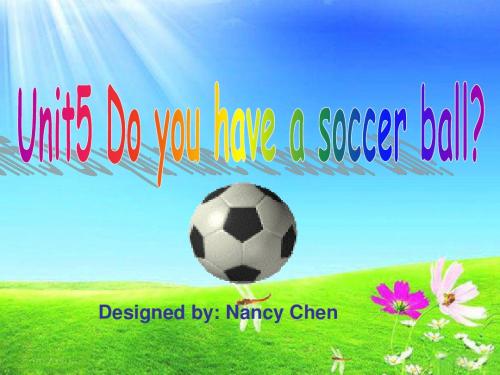
.
Does he have a\an ? Yes,he does. He has a\an . No,he doesn’t. He doesn’t have a\an
.
This is Tom’s room.
2a Listen to the conversations. Number the pictures [ 1- 4 ]. 听对话,给下面的图片编号【1—4】。
Dale
4
3
Paul
2
1
2b.Listen again. Match the people with the balls. 再听一遍录音,将人物与各种球匹配。
1 2 3 4
paul
Dale
32Biblioteka 14A: I have a... She/He has a...
B: She/He has a... I have a ...
Do you have a ... ? Let's play... Yes, I do. No,I don't. I have a ... .
ping-pong ball ping-pong bat
tennis bat soccer ball
baseball / baseball bat basketball volleyball
I have a book. You have an English book. We have a pen. They have a pencil.
She has a book.
He has an English book.
My uncle has a pen. Yao Ming’s father has a basketball.
人教pep版七年级英语上册 Unit5DoyouhaveasoccerballSectionA备课资料
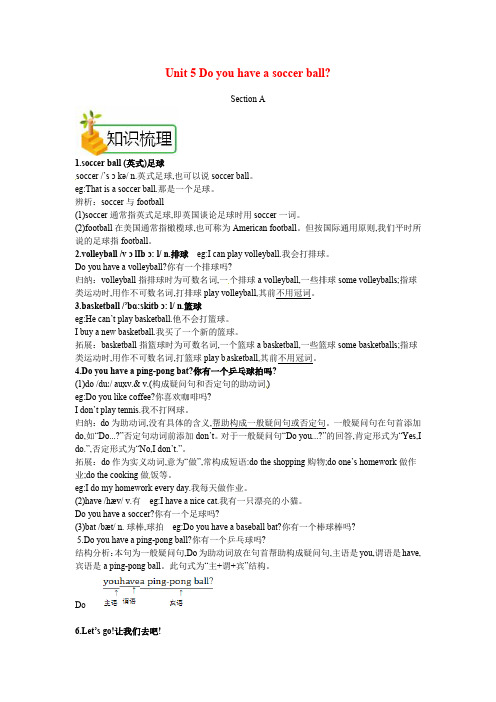
Unit 5 Do you have a soccer ball?Section A1.soccer ball (英式)足球soccer /’sɔ kə/ n.英式足球,也可以说soccer ball。
eg:That is a soccer ball.那是一个足球。
辨析:soccer 与 football(1)soccer通常指英式足球,即英国谈论足球时用soccer一词。
(2)football在美国通常指橄榄球,也可称为American football。
但按国际通用原则,我们平时所说的足球指football。
2.volleyball /v ɔ lIb ɔ: l/ n.排球eg:I can play volleyball.我会打排球。
Do you have a volleyball?你有一个排球吗?归纳:volleyball指排球时为可数名词,一个排球a volleyball,一些排球some volleyballs;指球类运动时,用作不可数名词,打排球play volleyball,其前不用冠词。
3.basketball /’bɑ:skitbɔ: l/ n.篮球eg:He can’t play basketball.他不会打篮球。
I buy a new basketball.我买了一个新的篮球。
拓展:basketball指篮球时为可数名词,一个篮球a basketball,一些篮球some basketballs;指球类运动时,用作不可数名词,打篮球play b asketball,其前不用冠词。
4.Do you have a ping-pong bat?你有一个乒乓球拍吗?(1)do /duː/ auxv.& v.(构成疑问句和否定句的助动词)eg:Do you like coffee?你喜欢咖啡吗?I don’t play tennis.我不打网球。
归纳:do为助动词,没有具体的含义,帮助构成一般疑问句或否定句。
2019-2020年七年级英语上册Unit5DoyouhaveasoccerballSectionA
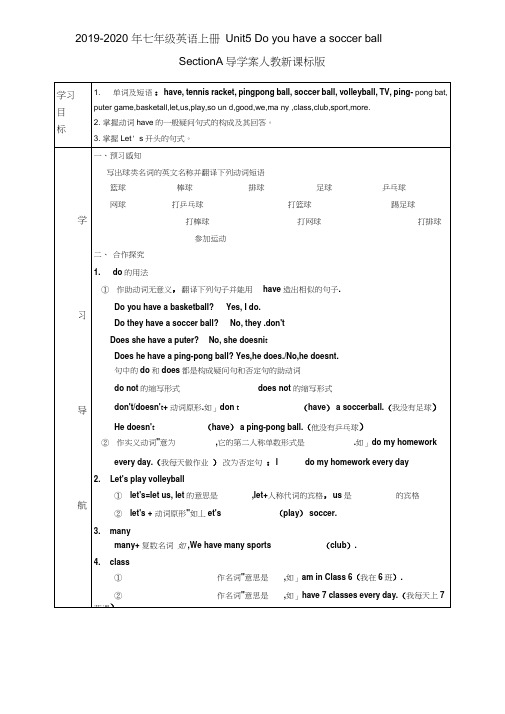
2019-2020 年七年级英语上册Unit5 Do you have a soccer ballSectionA导学案人教新课标版学习目标1. 单词及短语:have, tennis racket, pingpong ball, soccer ball, volleyball, TV, ping- pong bat,puter game,basketall,let,us,play,so un d,good,we,ma ny ,class,club,sport,more.2. 掌握动词have的一般疑问句式的构成及其回答。
3. 掌握Let' s开头的句式。
学习导航一、预习感知写出球类名词的英文名称并翻译下列动词短语篮球棒球排球足球乒乓球网球打乒乓球打篮球踢足球打棒球打网球打排球参加运动二、合作探究1. do的用法①作助动词无意义,翻译下列句子并能用have造出相似的句子.Do you have a basketball? Yes, I do.Do they have a soccer ball? No, they .don'tDoes she have a puter? No, she doesni tDoes he have a ping-pong ball? Yes,he does./No,he doesnt.句中的do和does都是构成疑问句和否定句的助动词do not的缩写形式does not的缩写形式don't/doesn't+ 动词原形.如」don t (have) a soccerball.(我没有足球)He doesn't (have) a ping-pong ball.(他没有乒乓球)②作实义动词"意为,它的第二人称单数形式是.如」do my homeworkevery day.(我每天做作业)改为否定句:l do my homework every day2. Let's play volleyball①let's=let us, let的意思是,let+人称代词的宾格,us是的宾格②let's + 动词原形"如丄et's (play) soccer.3. manymany+ 复数名词如 ,We have many sports (club).4. class①作名词"意思是,如」am in Class 6(我在6班).②作名词"意思是,如」have 7 classes every day.(我每天上7节课)单龙寺初中英语导学案年级七课题Unit5 Do you have a soccer ba? SectionA 主备教师金永生审杳人_聂宜军_________ 时间xx.10_单龙寺初中英语导学案年级 七 课题 Unit5 Do you have a soccer ball? SectionB_ 主备教师 审查人 时间 检测 反馈一用所给单词的适当形式填空 1」don ' (have) a soccer ball.2. H e doesn't (have) a tennis racket.3. D o vou (have) a dictionary?4. L et ' (plav) vollevball.5.That (sound) good.6. P lease call (we) at 495-3935.7. (Do) she have a sister? 8.(Do)Alan have an eraser?二. 翻译下列句子 1. 你有乒乓球吗? 2. 他有排球吗? 3我爸爸没有电脑。
人教版新教材七年级英语上unit5_do_you_have_a_soccer_ball_SectionB
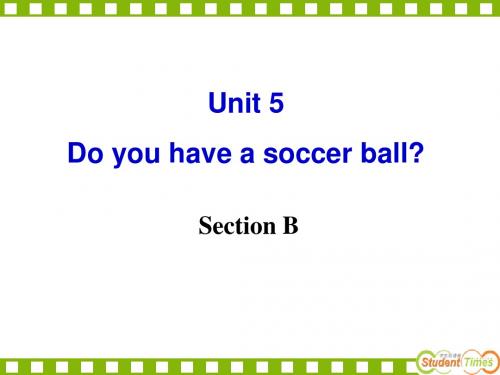
Haha! It’s difficult.
boring 无聊的,令人生厌的
Hmm. It’s boring.
1. interesting 有趣的, 令人感兴趣的
2. fun
有趣的, 令人愉快的
3. relaxing
4. difficult
5. boring
轻松的
困难的
无聊的, 令人生厌的
What do the pictures mean?
Let play baseball.
A: Let’s play basketball. B: I
don’have t a basketball.
A: Well, let’s play ping-pong.
B: That play volleyball.
B: I don’t have a volleyball.
A: Well, let’s play soccer. B: That sounds good/interesting/fun…
A: Let’s … B: That sounds good/interesting/difficult/
boring/fun/relaxing/....
computer
___you _____ Do have a computer? Yes, I_______. do I ______ have a computer
√
___ he have _____ Does a ruler? No, he doesn ______. ’t ’t have a Hedoesn __________ ruler.
有趣的
2a Find the sports words in the unit. Write them in the correct column.
七年级英语 unit 5 do you have a soccer ball section a
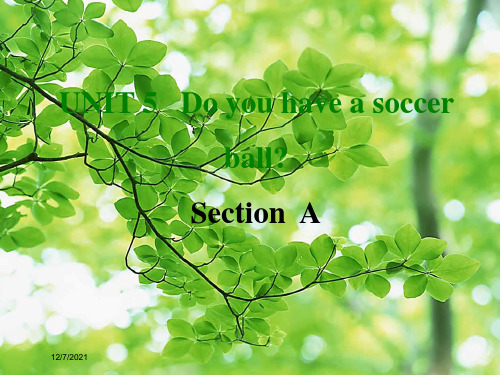
04 We’re late! 我们迟到了!(教材P26 2d) late的用法
late在此处为形容词,意为“迟到的;晚的”。其反 义词为early,意为“早的”。常构成固定短语be late for…,意为“迟到……”。 * He is never late for school. 他上学从不迟到。 【拓展】 late还可用作副词,意为“迟地;晚地”。 * I get up late today.今天我起床晚了。
12/7/2021
2a Listen to the conversations and number the pictures [1-4].
12/7/2021
2b Listen again.Match the pictures in 2a with the balls.
12/7/2021
2c Ask and answer questions about the people in 2a. —Does Jane have a tennis ball? —No, she doesn’t.
指具体的“网球”,为可数名词, 有单复数之分 指“网球”这项运动,无单复数之分
* Do you have a tennis ball?你有一个网球吗? * I like tennis.我喜欢网球(运动)。
12/7/2021
【拓展】
12/7/பைடு நூலகம்021
02 Do you have a ping-pong bat? 你有乒乓球拍吗? (教材P25 1c )
【解析】句意:——多么好的一天啊!让我们去钓鱼
吧。——。我们什么时候走?赞同别人的提议时用
good idea,意为“好主意”。故选B。
人教版七年级上册英语-Unit5 Do you have a soccer ball section
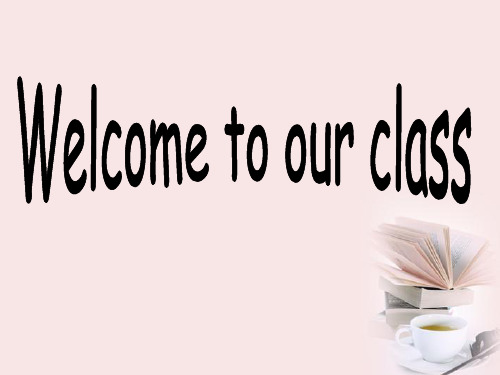
__D_o__e_s_
she + __h_a_v_e__ + 宾语?
he
3. He /She has……..是__陈_述__句____(疑 问句/ 陈述句).是第__三__人称__单_数___(单 数/复数)形式。用来表达 ___他_/_她_拥__有_某__物__.
4.陈述句的基本句型:
He + __h_a_s__ + 宾语。
Does he have a backpack?
Yes No
Yes, he does. He has a backpack.
No, he doesn't.
He doesn’t have a backpack.
第三人称单数提问用‘does’,陈述句是‘ha
Summary:
1.Does he/she/
2. Do they have……?用来询问__他__们__有__某_物__吗__?___。 是对第三人称的_复__数___(单数/复数)的提问。 肯定回答__Y_e_s_,_t_h_e_y_d_o_.__ 否定回答__N__o_, _th_e_y__d_o_n_’_t_. _
3.对某人是否拥有某物的提问的句型:
Names Do you have … Balls you have
Period 2 Grammar
Do you /they have a… ? Yes, I/they do. No, I/they don’t. Does he/she have a… ? Yes, he/she does. No, he/she doesn’t.
__T_h_e_y _
5. I / They don’t have ……..是否定句 ________(肯定句/否定句一).是第____ 人三称和第_____复数用某来人表没达有某物 ________________ 6. 基本句型:
人教版七年级上册英语unit5doyouhaveasoccerball-sectionb(3a—selfcheck)
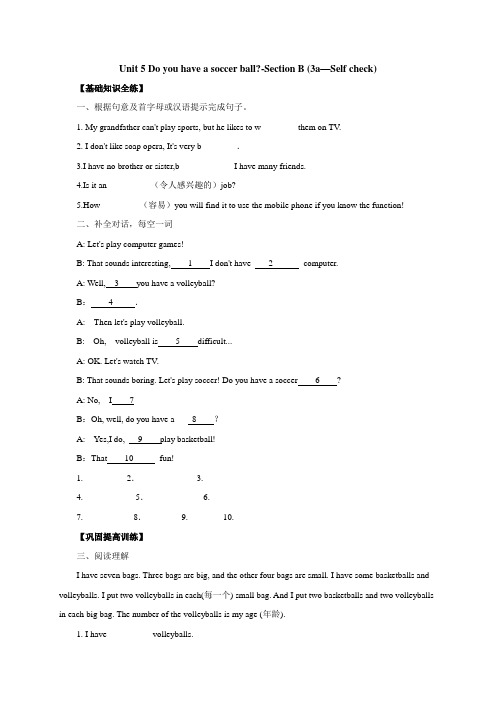
Unit 5 Do you have a soccer ball?-Section B (3a—Self check) 【基础知识全练】一、根据句意及首字母或汉语提示完成句子。
1. My grandfather can't play sports, but he likes to w________ them on TV.2. I don't like soap opera, It's very b________.3.I have no brother or sister,b____________ I have many friends.4.Is it an__________(令人感兴趣的)job?5.How_________(容易)you will find it to use the mobile phone if you know the function!二、补全对话,每空一词A: Let's play computer games!B: That sounds interesting, 1 I don't have 2 computer.A: Well, 3 you have a volleyball?B: 4 .A: Then let's play volleyball.B: Oh, volleyball is 5 difficult...A: OK. Let's watch TV.B: That sounds boring. Let's play soccer! Do you have a soccer 6 ?A: No, I 7B:Oh, well, do you have a____8 ?A: Yes,I do,_ 9 play basketball!B:That 10 fun!1. _________ 2.____________3.____________4.__________ 5.____________ 6._________7. ___________8.________9.________10._________【巩固提高训练】三、阅读理解I have seven bags. Three bags are big, and the other four bags are small. I have some basketballs and volleyballs. I put two volleyballs in each(每一个) small bag. And I put two basketballs and two volleyballs in each big bag. The number of the volleyballs is my age (年龄).1. I have__________ volleyballs.。
Unit 5 Do you have a soccer ball Section A_PPT课件
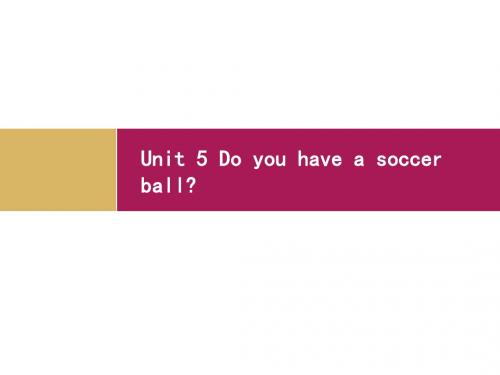
3.Read the passage about Gina Smith.
Fill in the blanks.
Gina _h_a_s__ two soccer balls. Shel_o_v_e_s__ sports, _b__u_t she doesn’t _p_l_a_y__ them. She only _w__a_tc__h_e_sthem on TV.
tennis ball , tennis bat, ping-pong ball, baseball, soccer ball, volleyball, basketball.
Things I have
Things I don't have
___________
________________
___________
-9-
Who has soccer balls?
Frank Brown
Gina Smith
Wang Wei
-10-
I don’t have a soccer ball, but my brother Alan does. We love soccer. We play it at school with our friends. It’s relaxing.
I have two soccer balls. I love sports, but I don’t play them — I only watch them on TV!
I like ping-pong. It’s easy for me. I have three ping-pong balls and two ping-pong bats. After class, I play ping-pong with my classmates.
七年级英语上册教案:unit_5_do_you_have_a_soccer_ball_section_b_(2a~self_check)
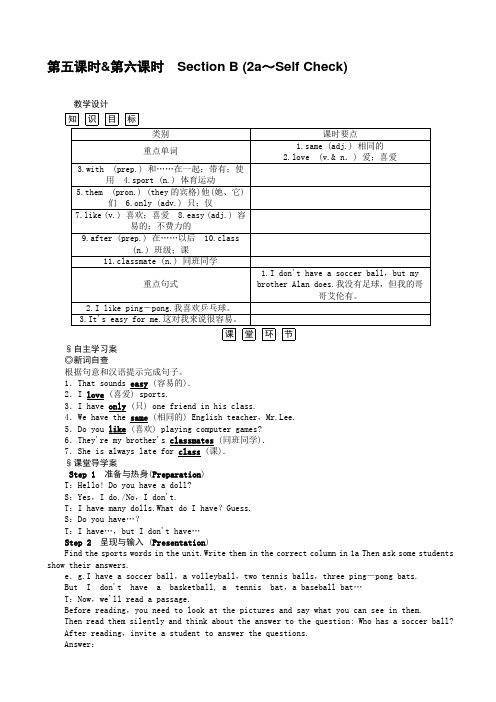
第五课时&第六课时Section B (2a~Self Check)教学设计知识目标课堂环节§自主学习案◎新词自查根据句意和汉语提示完成句子。
1.That sounds easy (容易的).2.I love (喜爱) sports.3.I have only (只) one friend in his class.4.We have the same (相同的) English teacher,Mr.Lee.5.Do you like (喜欢) playing computer games?6.They're my brother's classmates (同班同学).7.She is always late for class (课).§课堂导学案Step 1准备与热身(Preparation)T:Hello! Do you have a doll?S:Yes,I do./No,I don't.T:I have many dolls.What do I have?Guess.S:Do you have…?T:I have…,but I don't have…Step 2呈现与输入(Presentation)Find the sports words in the unit.Write them in the correct column in 1a Then ask some students show their answers.e.g.I have a soccer ball,a volleyball,two tennis balls,three ping-pong bats.But I don't have a basketball, a tennis bat,a baseball bat…T:Now,we'll read a passage.Before reading,you need to look at the pictures and say what you can see in them.Then read them silently and think about the answer to the question: Who has a soccer ball?After reading,invite a student to answer the questions.Answer:Alan has a soccer ball.Gina Smith has two soccer balls.Teacher reads the passage,and ask students to repeat sentence by sentence. Explain the language points at the same time.Students read the passage 2b again.Then look through the sentences in 2c.Students finish the task in 2c.Teacher checks the answers.Students thinks about some questions about equipments as the example in 3a.Then share the questions in pairs.Do this survey in pairs and answer by yes or no questions.Make some conversations according to 3a.Step 3练习与体验(Practice)Let students exchange books with a partner and answer his or her questions in 3a:Do you have…?Find people in the class who have these things.(3b)I don't have a baseball,but I have a soccer ball.Tom has a baseball,but he doesn't havea baseball bat.Step 4运用与生成(Production)1.Let students work in groups to list all the sports they know and write what they think of them.2.Let students work in groups to complete the questions and answers.3.Check their answers.Step 5巩固与提高(Progress)【探究点】I don't have a soccer ball,but my brother Alan does.我没有足球,但我哥哥艾伦有。
人教版七年级英语上册unit 5 Do you have a soccer ballSection

Do you have a/an …? Yes, I do. /No, I don’t. Where is it? It is…
3a Write each word in the correct place in the chart.
七年级上
Unit 5 Do you have a soccer ball?
Section A Period Two
Words review
great adj. 美妙的;伟大的 play v. 玩;打(球) sound v. 听起来 interesting adj. 有趣的
Lead-in 1
Let’s chant!!
pprinagc-tipcoentghbeacllo, ntovoe.rsations with A:yHomurmp…alrettn'sear.sk.
A: __D__o__ your friends have a
basketball?
B: Yes, they ___d_o__. They have two basketballs
Do you have a soccer ball? Do you have a soccer ball? Yes, I do. Yes I do. Do you have a volleyball? Do you have a volleyball? No, I don’t. No, I don’t.
Lead-in 2
Do you know where the 2014 FIFA World Cup was held?
七年级英语上册 Unit 5 Do you have a soccer ball Section B

七年级英语上册 Unit 5 Do you have a soccer ball Section B例题与讲解(新版)人教新目标版Unit 5 Do you have a soccer ball?Section B2bDo You Have a Soccer Ball?Frank Brown:I don't have a soccer ball,but my brother Alan does.[1]We go to the same school and we love soccer.We play it at school with our friends.It's relaxing.Gina Smith:Yes,I do.I have two soccer balls,three volleyballs,four basketballs and five baseballs and bats.[2]I love sports,but I don't play them—I only watch them on TV!Wang Wei:No,I don't.Soccer is difficult.[3]I like pingpong.It's easy for me.I have three pingpong balls and two pingpong bats.[4]After class,I play pingpong with my classmates.2b你有足球吗?弗兰克·布朗:我没有足球,但我哥哥艾伦有。
我们上同一所学校,而且我们都喜欢足球。
我们和我们的朋友在学校踢足球。
它能让人放松。
吉娜·史密斯:是的,我有足球。
我有两个足球,三个排球,四个篮球,五个棒球和球棒。
我酷爱运动,但是我自己不怎么玩儿——我只喜欢看电视上的运动。
七年级英语上册_Unit_5_Do_you_have_a_soccer_ball_Section_A-1课件_人教新目标版

5. I have six baseball bats. (对划线部分提问) ______ _______ What ______ do _______ you have ?
Does he have a basketball?
Yes, he does.
√
Does he have a basketball? No, he doesn’t.
×
Does he have a hat? Yes, he does. Where is the hat? It’s on & Phrases
same love with sport them only
like easy after class classmate
• same • love • them them. • sport • only
the same school/ jacket/clock… I love sports. They are my family, and I love Basketball is my favorite sport. I’m the only child.
Match the words with the pictures.
c 3. fun√___ b 5. relaxing ___ 1.interesting√___ a e 2. boring√ ____ d 4. difficult√___
What does Tony say about these activities?
陈惠玲
- 1、下载文档前请自行甄别文档内容的完整性,平台不提供额外的编辑、内容补充、找答案等附加服务。
- 2、"仅部分预览"的文档,不可在线预览部分如存在完整性等问题,可反馈申请退款(可完整预览的文档不适用该条件!)。
- 3、如文档侵犯您的权益,请联系客服反馈,我们会尽快为您处理(人工客服工作时间:9:00-18:30)。
《Unit5 Section A 》问题导读—评价单
难点:动词have的一般现在时的用法,使用do和does引导的一般疑问句的构成和简单回答
课时安排 2 课型1.问题发现课 2.综合解决课
知识链接:kinds of sport体育运动种类: trackandfield田径athletics田径运动fug-of-war拔河indoorsports 室内运动outdoorsports室外运动body-bulding exercises健身运动dragonboatrace龙船竞赛horserace sportsmeet运动会
问题导读(内容性问题+知识性问题+思想性问题+习题性问题+拓展性问题等)学科长领读1a的单词和句子3遍,翻译成汉语,写在课本上。
完成单词与图片匹配
3.That sounds good / interesting. 听起来很好(不错)/很有趣。
4.I don’t have a soccer ball. 体会如何变否定句
回顾第一单元内容,再朗读27页的4,大声朗读2遍,扫除单词障碍;小声细读遍,完成课本上的表格。
并利用这个情境,相互交换表格,增加小组内成员的了解。
体育俱乐部sports club 名first name 姓last name
many adj. 大量的,许多的,修饰可数名词复数
如:许多俱乐部many clubs 许多书many books 许多
朗读完成后,思考下列词组:
自我评价:______ 学科长评价:_______ 组长评价:______ 教师评价:_______。
